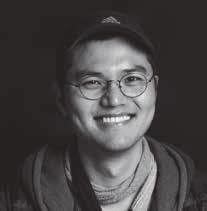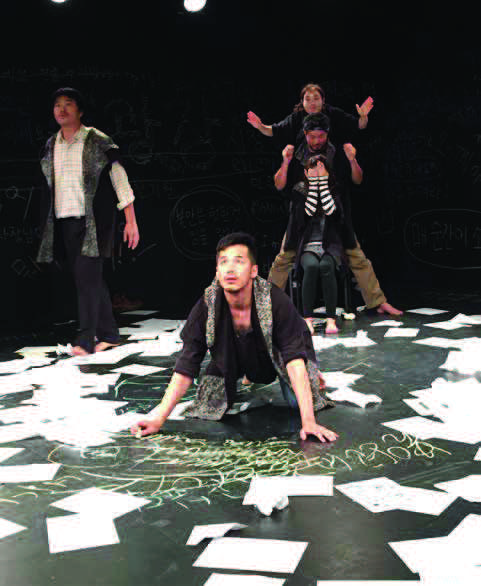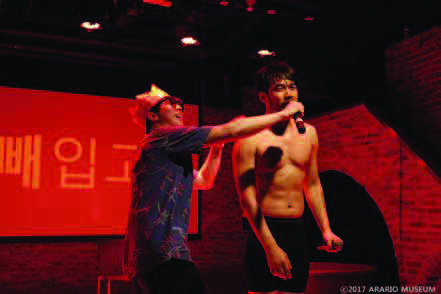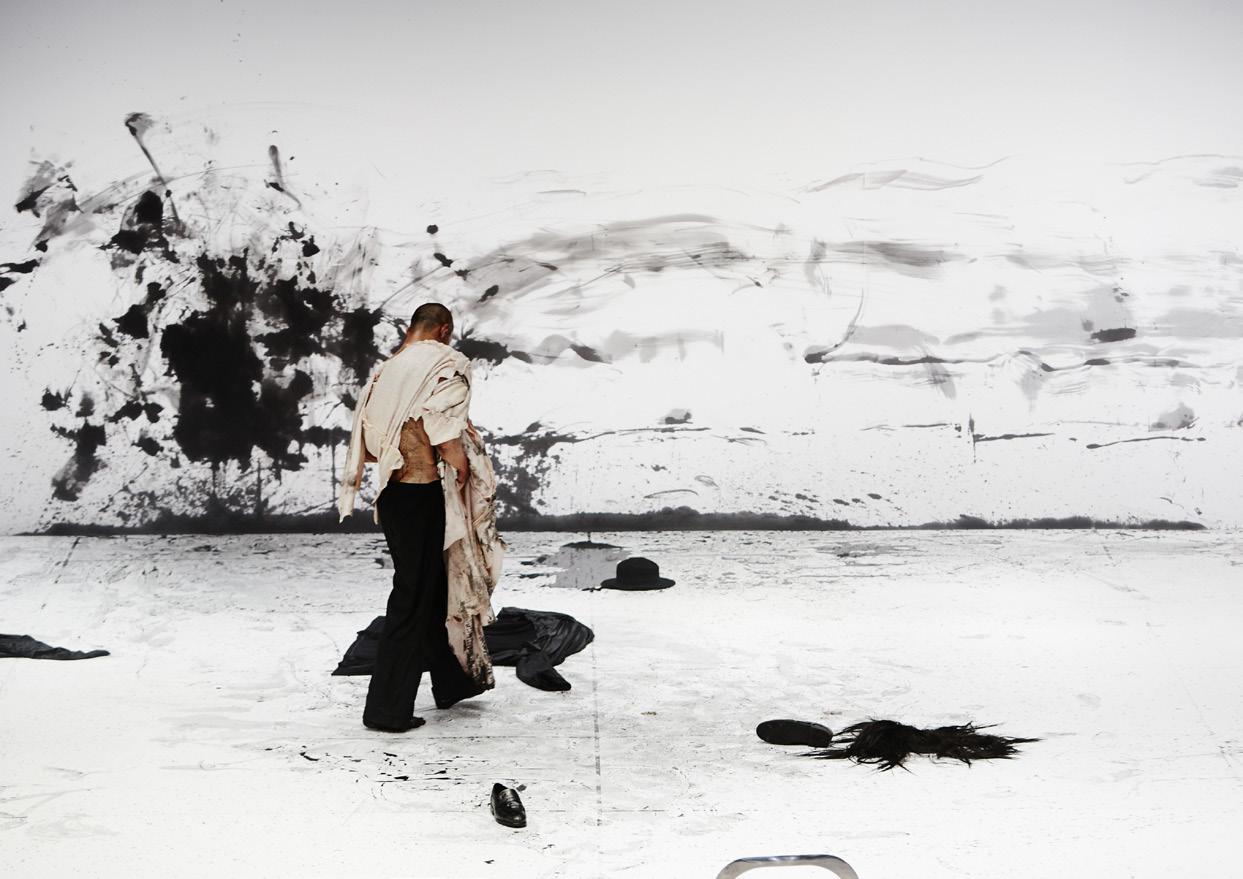Performance Info
KIM Jeong (President and director of Project WHILE)
: Literature written corporally
The reality of the Korean performing arts scene is that there aren’t many directors who haven’t majored in theatre or directing. How did you get into theatre as a non theatre major?
I studied journalism in university. I saw my first theatre piece when I stumbled upon a job working as an usher at National Theater of Korea, which was near the university I attended. I saw a licensed musical many times while it was running at the main theatre there and it gave me goosebumps and got my heart racing. Afterwards, during my senior year, I was preparing for job interviews for general corporate positions and had facial paralysis due to the stress for half a year. I thought to myself that I couldn’t go on like that and decided to jump into the field that I wanted to be in the most so I tried many different things within the field, such as working as a house manager and at a production company. However, it did not give me the thrill I initially felt when encountering theatre. I thus decided to try to be involved in a creative capacity and begged someone to let me do anything, even watch, at rehearsal and that was what brought me to Theatre Moollee led by director HAN Tae Sook.
So a twenty something with little to no experience suddenly became the assistant director for one of the greatest figures in modern Korean theatre, HAN Tae Sook. How was that experience?
Around 2009, I was put into productions of grand scales such as those produced by the Seoul Arts Center or the production for the reopening of the Myeongdong Theater, without having learned the ropes or having sufficient knowledge of the field. Because they were such large productions, there were so many tasks that the assistant director needed to perform. I had a hard time being fully present and focused while working on a HAN Tae Sook production, which was typically dark, difficult and heavy. After gaining experience for one year in a state that left much for wanting, I was appointed to lead and manage the team on behalf of the director for God of Carnage (Yasmina Reza, 2010) and that was when I started to enjoy the work bit by bit.
Around that time I saw the company’s production of Lady Macbeth at the 2012 Singapore Arts Festival and I felt the vibrations I had when I saw a theatre production for the first time. It was not an easy piece to participate in as assistant director, as it was of a grand scale with lots of objects and some of the greatest Korean actors, but upon seeing the actual show I felt the urge to continue supporting HAN Tae Sook. Also, after a standing ovation from the Singaporean audience there was an after party and an intense conversation regarding the production ensued between the directing team and actors and I thought to myself, “this is indeed the scene of a theatre production.” For a while afterwards I accumulated experience with not only director Han but with other senior directors as well, as assistant director.
The conversations in the rehearsal space, ordinary people striving for a common goal, the concentration of energy and the almost religious belief that there is something there that cannot be seen; I was enamored with this whole process. I think that it was even more attractive to me because I am such a rational person.
How and when did the Project WHILE come about?
I wanted to direct but I was scared to do it alone. In 2014, some of the actors and staff members of the production I was working on as assistant director got together and created Project WHILE in order to work on our own projects. I also felt a bit anxious upon turning thirty. I didn’t want to stay an assistant director that is exceptionally good at handling the relationship between director and actors, forever. The very first project we worked on was a workshop of Ghosts by Henrik Ibsen and that was where we all saw potential in each other. Our first official production was a radio drama scenario written by the German writer Gunther Eich called, Dreams in 2016.
There are no official members in the company so it is more like a project team surrounding me.
In 2016, the team garnered lots of attention with another translated adaptation, King in the Square.
It is a poetry play written by the Russian symbolism poet Alexandr Blok that is set in the beginning of the Russian revolution in the beginning of the 1900s. I came across this piece coincidentally but I didn’t know how to approach it, so I was sitting on it for two years. Then, I found myself trying to evade the chaotic atmosphere of Korean society in 2015. After being in the spotlight for the incident in which our play was stopped due to censorship back in 2015, I decided to put King in the Square on stage. I wanted to interpret the poetic lines that contained the dilemmas of the writers and intellectuals of Russia during the revolution into our reality here in Korea in 2016. The very first production that focused on the lines, the version that was shown at the Gumi Asia Theatre Festival and the “Censorship Dismissal” version that focused on physical energy, are all different. I also wish to try this piece in an outdoor setting.
There were two projects you worked on in 2017, a new piece by renowned Korean playwright, Visitors, and a solo performance that was named after and inspired by Hamlet. In your previous works, powerful literal texts and strong physicality were displayed. What do you focus on in your work?
Both. I think that literal expression is missing in a lot of contemporary productions as of late. Verbatim plays and documentary plays are leading the scene and they are very sophisticated means of expression but I feel as though it doesn’t really bring anything to surface on stage in the end. I wish to express the ‘power of speech’ and a ‘mythical universe’ on stage. That is why my work is based on text.
In the case of Visitors (2017), which was my first Korean play, although it based on a grotesque motif that dealt with a child who had murdered his own parents, I appreciated the mythicism and symbolism that is characteristic of GOH Yeon Ok. The experience of staging a new piece by a Korean playwright, I learned how to trust the script and interpret the text from a director’s point of view.
I co-directed LIM Young Jun Hamlet (2017) with HA Su Min. I wanted to convey the actor’s storytelling and charm in a direct way because it was a solo performance. Isn’t it every male actor’s dream to play Hamlet? The actor was in a near trance-like state while talking about this and this was not as ‘Hamlet’ as much as it was the actor’s attitude towards theatre itself.
Another factor that is a source of inspiration in my work is the body. I learned a lot about expression from a mime artist that I had worked with since I worked with HAN Tae Sook. That being said, my goal is to create an explosive energy through movement rather than a have detailed choreography.
This is your third year in the theatre scene. At this point, what does theatre mean to you and what kind of work do you want to do in the future?
When I see actors who have explosive energy on stage, theatre seems like a religion. A desire to face God through the stage. As society becomes more rational and sophisticated, the world that the theatre contains becomes smaller. In this age, it might be due to the fierce competition for survival. I am contemplating ways to live and create fierce rather than compete fiercely for survival. I dream of working with the impossible.
* Photo "Lim Young Jun Hamlet" copyright : 2017 ARARIO MUSEUM
Production Details
- Director
KIM Jeong
Reference
- E-mailshinji8406@naver.com












 PREV
PREV
.jpeg)
.jpg)
_(c)포스(FORCE).jpg)
_(c)장석현_코끼리들이 웃는다(SUKHYUN JANG_ELEPHANTS LAUGH).jpg)
.jpg)
.jpg)
_(c)한받(Hahn Vad).jpg)
_(c)비주얼씨어터 꽃(CCOT)(1).jpg)
_(c)봉앤줄 (BONGnJOULE)(1).jpg)
_(c)대한민국연극제 2019 (Korea Theater Festival 2019)(0).jpg)
_(c)몸꼴(Momggol)(1).jpg)
.png)
2018MODAFE_Taemin Cho (2).jpg)











